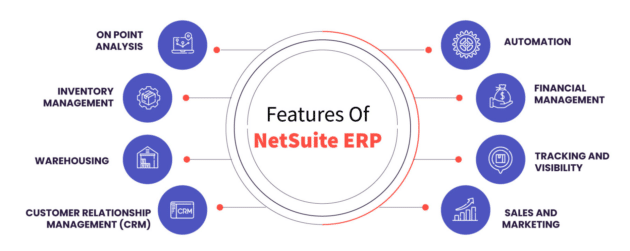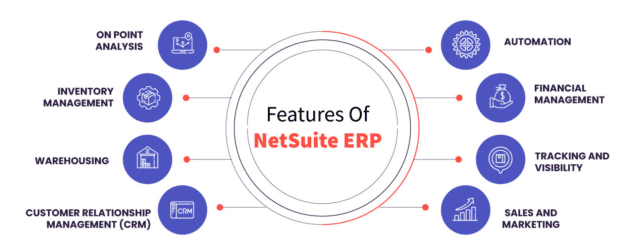NetSuite ERP: A Comprehensive Guide to Cloud-Based Enterprise Resource Planning – In today’s fast-paced business world, organizations constantly search for ways to streamline operations, increase efficiency, and stay competitive. One of the most effective tools that companies can leverage is Enterprise Resource Planning (ERP) software. NetSuite ERP is one of the most popular and comprehensive cloud-based systems among the many ERP solutions available. It offers an extensive range of features that cater to businesses of all sizes, providing them with a flexible, scalable, and integrated solution.
This article will explore NetSuite ERP’s features and benefits and how it can help businesses achieve their goals.

What is NetSuite ERP?
NetSuite ERP is a cloud-based Enterprise Resource Planning solution designed to manage and automate core business processes in real time. Founded in 1998 and later acquired by Oracle in 2016, NetSuite has become one of the leading ERP platforms globally. It is specifically designed to support various industries, including retail, manufacturing, wholesale distribution, and services, making it a versatile option for companies with diverse needs.
As a comprehensive ERP system, NetSuite includes modules for financial management, order management, supply chain management, procurement, production, and human capital management (HCM). By integrating these critical functions into a single platform, NetSuite helps organizations eliminate silos, increase collaboration, and make data-driven decisions.
Key Features of NetSuite ERP
Financial Management One of NetSuite ERP’s most robust capabilities is its financial management module. It provides a real-time view of economic data, helping businesses maintain accurate records, comply with regulations, and efficiently manage assets and cash flow. Key features include general ledger, accounts payable and receivable, financial reporting, budgeting, and multi-currency support. With NetSuite’s financial automation capabilities, businesses can eliminate manual processes and reduce errors, ensuring greater transparency in financial operations.
Customer Relationship Management (CRM) Integration While NetSuite is primarily known for its ERP functionality, it also offers an integrated CRM system that helps businesses manage customer relationships throughout the entire customer lifecycle. This includes lead management, sales automation, marketing campaigns, customer service, and support. The tight integration between CRM and ERP gives businesses a 360-degree view of their customers, helping them provide better service, increase customer retention, and drive sales.
Order Management Effective order management is crucial for any business, and NetSuite ERP offers a robust order management system. It allows organizations to automate order processing, streamline order-to-cash cycles, and ensure customer orders are fulfilled accurately and on time. By integrating order management with inventory, fulfillment, and shipping, businesses can eliminate bottlenecks and improve customer satisfaction.
Inventory and Supply Chain Management NetSuite ERP helps businesses manage their supply chain and inventory in real time, allowing them to optimize stock levels, reduce carrying costs, and ensure timely fulfillment. The system includes demand planning, procurement, manufacturing, and distribution management tools. These features help businesses forecast demand, manage suppliers, and ensure that raw materials and finished products are available when needed.
Human Capital Management (HCM) The HCM module within NetSuite helps businesses manage their human resources, from recruitment to retirement. It offers tools for payroll management, employee performance tracking, benefits administration, and workforce planning. By automating HR processes, companies can reduce administrative overhead and focus on strategic talent management initiatives.
Business Intelligence and Reporting NetSuite ERP provides powerful business intelligence (BI) tools that allow users to create detailed reports, dashboards, and analytics. With real-time data across all departments, businesses can monitor performance metrics, track KPIs, and make informed decisions. NetSuite’s reporting tools are highly customizable, allowing users to tailor reports to meet their business needs.
Benefits of NetSuite ERP
Scalability One of NetSuite ERP’s main advantages is its scalability. As a cloud-based solution, it is designed to grow with your business. Whether a small startup or a multinational corporation, NetSuite provides a flexible platform that can scale according to your needs. Companies can add new users, locations, and subsidiaries without complex infrastructure changes, making it a future-proof investment.
Cloud-Based Deployment NetSuite ERP is a fully cloud-based solution, so expensive on-premises hardware or software installations are unnecessary. This reduces IT costs, as businesses do not need to maintain servers or manage updates. Additionally, cloud deployment ensures that users can access the system from anywhere in the world, making it ideal for organizations with remote teams or multiple locations.
Real-Time Visibility One of NetSuite ERP’s core strengths is its real-time visibility of all business aspects. With a centralized platform that integrates data from various departments, decision-makers can get instant insights into financial performance, inventory levels, customer behavior, and more. This level of visibility enables faster, more accurate decision-making, helping businesses stay agile in a competitive environment.
Automation Automation is a crucial feature of NetSuite ERP, helping businesses eliminate manual processes and reduce errors. From financial management to order processing, NetSuite automates routine tasks, allowing employees to focus on more strategic activities. This increased efficiency can lead to cost savings and improved organizational productivity.
Global Business Management For organizations with an international presence, NetSuite ERP offers robust tools for managing global operations. The system supports multiple currencies, languages, and tax regulations, making it easier for companies to operate in different regions. With a unified platform, businesses can manage global subsidiaries, streamline intercompany transactions, and ensure compliance with local laws.
Customizability and Flexibility Another significant benefit of NetSuite ERP is its high level of customization. The platform can be tailored to meet the specific needs of various industries, including manufacturing, retail, services, and more. Users can also configure workflows, reports, and dashboards to suit their preferences, ensuring the system works seamlessly with their business processes.
Industry-Specific Solutions
NetSuite ERP is not a one-size-fits-all solution. Instead, it offers industry-specific features that cater to the unique needs of various sectors. For example, manufacturers can use NetSuite’s production management tools, while retailers benefit from its omnichannel commerce capabilities. Service-based businesses can use project management features to track time and billing, ensuring they deliver high-quality client services.
Challenges and Considerations
While NetSuite ERP offers many benefits, businesses must consider some challenges when implementing the system. For example, the cost of implementation can be high, particularly for smaller companies. Although NetSuite is scalable, the initial investment may be significant, especially when factoring in customizations, training, and ongoing maintenance.
Additionally, businesses may face challenges with data migration when switching from their current system to NetSuite ERP. This process requires careful planning and execution to ensure that data is transferred accurately and without disruptions to business operations.
Lastly, although NetSuite is known for its user-friendly interface, employees unfamiliar with ERP systems may still experience a learning curve. Investing in thorough training and support during the implementation phase can help mitigate these challenges.
Conclusion
NetSuite ERP is a powerful and versatile cloud-based solution that provides businesses with the tools to manage their operations efficiently. From financial management and supply chain optimization to human resources and business intelligence, NetSuite offers a comprehensive suite of features to help organizations streamline processes, improve collaboration, and make data-driven decisions.
By choosing NetSuite ERP, businesses can benefit from a scalable, flexible platform that grows with their needs. While there are challenges to consider, such as the cost of implementation and data migration, the benefits of automation, real-time visibility, and global management far outweigh the drawbacks.
NetSuite ERP provides businesses with the competitive edge they need to thrive in a world where agility and efficiency are critical for success.

